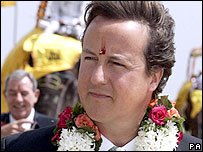UK aid to India is in the news again following a speech on emerging powers by UK Aid’s Secretary of State, Andrew Mitchell at Chatham House which was carried in a range of the UK media and in the Guardian today and trailed in the FT before the speech. The temperature is rising in some parts of the UK media such the Daily Express and Daily Mail. The later probably outraged more so because 6 months ago they were presumably briefed by aides on the axing of the India programme.
Mitchell’s take is now this – focus aid in India on the poor and poorest (side-stepping the various diplomatic elephants in the room – on the one hand aid is peanuts to India versus India is home to 450m or one in three of the world’s poor which sits uneasily with the image of an emerging world power).
Basically Mitchell’s line is ignore the contradictions and focus on the poor and poorest:
Some people – in both the UK and India – have been asking whether the time has come to end British aid to India. In my view, we are not there yet. The whole rationale for my Department is, eventually, to work ourselves out of a job. But having discussed this with the Government of India, I believe that, for the next few years, it is in both India’s interest and in Britain’s interest for us to continue our highly successful collaboration on development, not least so we can support the Government of India’s own successful programmes in the poorest priority areas.
If India doesn’t need the money why does the UK give aid to India and why does India accept?
Could be aid to India does the UK more good than cutting it because the UK has a ‘special relationship’ with India via history and the Indian diaspora in the UK. This makes it easier to turn a blind eye to the billions in the space programme and forex reserves and find more altruistic or pragmatic diplomatic reasons. For development bods at DFID and in the UK NGO’s it’s about supporting the poor. For diplomats and the foreign office aid is part of bilateral ties, security and intelligence sharing. Most importantly, the balance of power has swung towards India and the UK wouldn’t want to risk a long standing friendship with one of the world’s next big powers would it?
Turning this on its head one could equally well ask why would India accept UK aid when it’s such a small percentage of the government budget? Presumably the aid is either ultra-effective in poverty reduction and dfid has a comparative advantage in poverty know-how or maybe India officials just don’t want to rock the ‘special relationship’. One issue is the emergence of a difference of opinions between Indian foreign policy circles (keen to push the emerging power image) and domestic policy circles (and those who are very aware there are still millions of poor Indians and are doing a lot about it via new social programmes that are getting copied elsewhere). Of course, one issue is the UK relationship matters to India in terms of foreign policy because of India’s wish for a permanent security council seat. Trying to unravel foreign policy and aid never proved easy and it seems to be getting even harder to do so.




